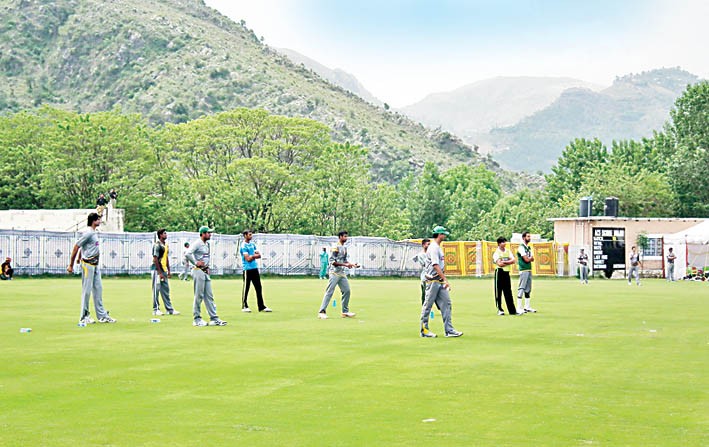
Sports in Pakistan will remain in crises because sports leadership is a complex art that needs to be understood by team captains, coaches and administrators

Pakistan sports face acute leadership crises at all levels. The disappointing performance of Pakistan in the World T20 championship and the unsatisfactory performance of Pakistan in the 12th South Asian Games in India have completely exposed our sports system and laid bare the fault lines in the hierarchical leadership at all levels.
On one hand the abundant sports talent in the country hardly gets any opportunity to show its abilities, while on the other the decision makers mutilate the system at will and whims to achieve their sinister designs that have ultimately harmed Pakistan sports beyond repair.
With sports having least priority in successive governments’ development agenda, it seems unlikely that Pakistan sports will show any signs of improvement in near future.
Besides developing "sports literacy" at the grassroots the country is in dire need of "sport leaders" who should steer the sinking ship of Pakistan sports through the turbulent times.
Thanks to Waqar Younis for accepting his part of responsibility and resigning from the coveted position for which he was never an ideal candidate.
Waqar rightly said that mere change of faces in PCB would not pay dividends, unless the system was put right through well-thought and far-reaching plans. But putting the system right is a hoary slogan that works against the designs of sports establishments in Pakistan.
Thus the Pakistani sports establishment immediately gangs up and defies any such move which is aimed at bringing the best sport practices home in the name of "lack of resources".
Pakistan is a country blessed with rich human resource and its people are generally sports loving, but no elaborate sports development programme exists in the country under government patronage.
There are no "sports literacy" programmes for school-going children or community-based sports for development initiatives or elite sport development programmes for the professional sportspeople with well-defined career paths.
Sports in Pakistan will remain in crises because sports leadership is a complex art that needs to be understood by team captains, coaches and administrators either through formal education of sport management or through specialised Sports Leadership Courses.
Suleman Arshad, a management student at University of Punjab who is visually impaired by birth, is a determined young rock climber who despite being handicapped underwent United Nation’s Organisation Sports for Development & Peace Youth Leadership Course at Tohoku in March 2016.
Arshad described his experience of attending the leadership camp as "awesome" as he learned how to use life skills in sports. Sportspersons from Nepal, Sri Lanka, India, Indonesia, Korea, Japan, Thailand, Philippines and Pakistan participated in the course.
Arshad said that besides learning many new aspects of sports leadership he learnt how fast-developing nations were using sports as a tool of development and in this effort the disabled and the underprivileged were not left behind at any stage.
Arshad may be both underprivileged and visually impaired but he has determination like Carlos Brathwaite of West Indies. Arshad knows that the leader’s "emotional intelligence" is the key determinant of team and organisational effectiveness. He knows that leaders are not essentially born and that the life skills are learnable.
Organisational Psychologist Richard Corn once asked members of a diverse set of teams to identify the root cause of their team performance. For teams that were performing well, over 60 percent of the explanations had something to do with someone’s personality or behaviour and that someone frequently was the team leader.
The performance of Pakistan in World T20 clearly shows how Shahid Afridi and Waqar Younis performed their roles as leaders as compared to Darren Sammy and Phil Simmons, who were able to transform a bunch of joyful cricketers into a winning combination.
Sammy and Simmons provided the West Indian team with a direction. They fine-tuned its structure and fostered team work. In the absence of all out support from West Indian Cricket Board the captain and the coach led from the front and did things in their own way, using idiosyncratic behavioural styles and strategies that they had found to work best for them.
The tempest came and passed and like many more failures this failure will also be soon forgotten. Our board is talking about radical steps. The coach has left and Afridi has quit as captain. A new selection committee is being appointed but would these changes serve the purpose?
The answer is an emphatic ‘No’, because whether one is forming a new team, assisting a team that has encountered performance problems or helping an already well performing team to do even better, the question is: is the team a real team, stabilised over a period of time that requires members to work interdependently to achieve some common goals? Is there expert coaching and dynamic captaincy available to the team to help its members minimise the inefficiencies?
If players are picked and dropped on last minute performances and leaders are appointed on political pressure not to lead but to develop the future political leadership of a particular party then God save the King.
Pakistan sports, particularly cricket, are facing acute leadership, organisational, structural and managerial crises which can’t be addressed by appointing blue-eyed and gray-haired managers.
A modern sports leader must have the ability to see through the fog and take bold and visionary decisions with emotional maturity and good measure of personal courage to salvage Pakistan sports.